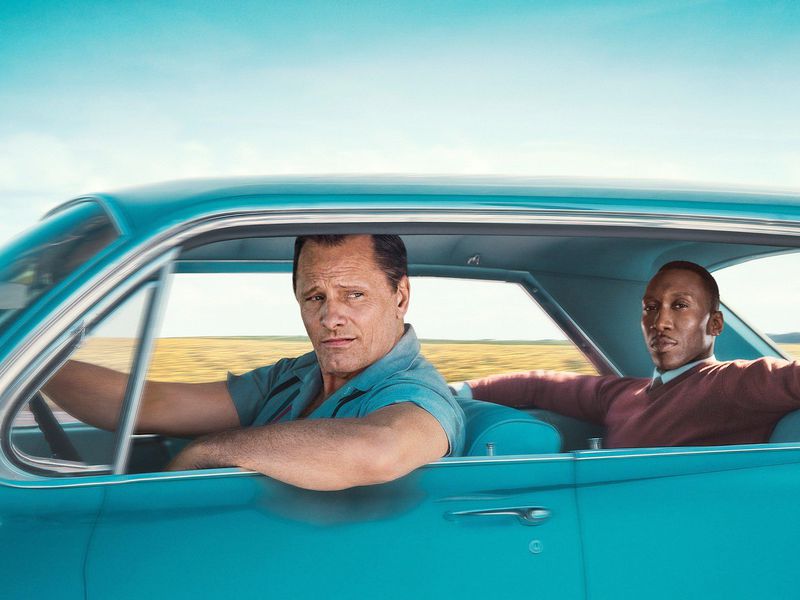Dialogue 1
Jingjing: So, Mark, have you seen any good movies lately?
京晶:那么,馬克,最近看什么好電影了嗎?
Mark: It's funny you should ask. The day before yesterday I saw a movie at the cinema. It was the first time in over a year I dragged myself out there to catch a flick.
馬克:你這么問挺有趣的。前天我就在影院看了部電影。這是一年多以來我第一次讓自己親自走進電影院看電影。
Jingjing: Ok, good for you. What'd you see?
京晶:噢,那真不錯。你看了什么?
Mark: It was called The Green Book. Have you seen it yet?
馬克:這部叫《綠皮書》。你看了嗎?
Jingjing: I haven't; but I've been hearing a lot about it. It won best picture, didn't it?
京晶:還沒,但關于它我已經聽說了不少。它獲得了(奧斯卡)最佳影片,對吧?
Mark: Yeah. I listened to an interview with the director on the radio. After it won, I thought I'd better see it while it's still in theaters.
馬克:是的,我聽了電臺對導演的采訪。獲獎之后,我想我最好趕在影院上映期間把它看了。
Jingjing: Is it better to see in the cinema?
京晶:在影院觀看更好嗎?
Mark: Of course, but it's still a good movie for small screens.
馬克:那當然,但它也仍是一部適合小屏幕觀看的好電影。
Jingjing: Well, I'll add it to my list. Can you give me the rundown without spoiling the plot?
京晶:這么一說,我要把它加入我的觀影單了。你能在不劇透情節的前提下給我大致概述下嗎?
Mark: I'll try. There's an Italian American guy who gets a job driving an African American guy on a concert tour through the states in the south east.
馬克:我試試。有一個意大利裔美國人,找了一份工作,開車帶一個非洲裔美國人到美國東南部開巡回演奏會。
Jingjing: Wait a sec—why does their race matter.
京晶:等一下,為什么他們的種族這么重要?
Mark: Oh, well it's a period film, and takes place in the 50s or 60s when Jim Crow laws are still in effect.
馬克:哦,它是一部年代電影,發生在吉姆·克勞法生效的五六十年代。
Jingjing: Weren't those laws about which schools and public wash rooms people could use, depending on their race?
京晶:這不是關于依種族決定人們可以使用哪些學校和公共洗手間的法律嗎?
Mark: You got it. America was pretty segregated, especially in south-eastern states until the Civil Rights movement in the late 1960s. And this story takes place just before that.
馬克:正是。在20世紀60年代末民權運動之前,美國是相當隔離的,特別是在東南部各州。而這個故事就發生在那之前。
Jingjing: Hmm, I heard it was based on a true story. Was it?
京晶:嗯,我聽說這是基于一個真實的故事,是嗎?
Mark: It's believable. And I bet African American musicians like the main character went on tour with private drivers. That's true to life, and a great premise for a movie.
馬克:這是可信的。并且我敢打賭像主角這樣的非裔美國音樂家和私人司機一起巡回演出,在生活中是真實的,也是電影的一個重要前提。
Jingjing: Now I really want to go see it.
京晶:現在我真想去看看。
New words : 習語短語
flick (informal) 電影
movie, film (because of the flicker of a movie projector)
a period film 年代電影
a story that takes place in a time long before the film was made
Jim Crow laws 吉姆克勞法
laws that didn't let African Americans go to the same schools or use the same public places as whites
吉姆·克勞法 (Jim Crow laws) 泛指1876年至1965年間美國南部各州以及邊境各州對有色人種(主要針對非洲裔美國人,但同時也包含其他族群)實行種族隔離制度的法律。這些法律上的種族隔離強制公共設施必須依照種族的不同而隔離使用,且在隔離但平等的原則下,種族隔離被解釋為不違反憲法保障的同等保護權,因此得以持續存在。但事實上黑人所能享有的部份與白人相較往往是較差的,而這樣的差別待遇也造成了黑人長久以來處于經濟、教育及社會上較為弱勢的地位。
segregated 隔離
separated places of living and work
the Civil Rights movement 民權運動
premise 前提,假定
the idea for a story, characters and what they will have to do
Dialogue 2
Mark: Hurry up, or you'll miss it in the theaters.
馬克:快點,不然你將錯過上映時間。
Jingjing: Why do you think it won best picture?
京晶:你覺得它為什么會獲得最佳影片?
Mark: Well, I don't know much about the other nominees. The Green Book did an excellent job showing what racial tensions were like 60 years ago.
馬克:嗯,我對其他提名者不太了解。綠皮書出色地展示了60年前的種族緊張狀況。
Jingjing: If someone has never been to America, would they understand the film?
京晶:如果有人從未去過美國,他們會理解這部電影嗎?
Mark: Definitely. That's why I think they made the film well. They show the difference between life in the north and life in the deep south.
馬克:當然。這就是為什么我認為他們拍的很好。他們展示了北方地區和南方腹地生活的差異。
Jingjing: Did you see it with your wife?
京晶:你和你太太一起看的嗎?
Mark: Yeah. She hasn't been to the U.S. yet, and she was asking me if it's still like that now.
馬克:是的,她還沒有去過美國,并且他問我現在的情況是否還這樣。
Jingjing: And, what'd you answer?
京晶:你怎么回答的?
Mark: There's still racial tension. I'm reminded of what Condeleeza Rice said about slavery, how it was a birth defect for America.
馬克:種族關系仍然緊張。我想起了康得利·萊斯關于奴隸制的說法,它是如何成為美國的先天缺陷。
Jingjing: Wow, yeah, it's hard to fix something like that. What about racial tensions nowadays?
京晶:哇,是的,那個解決起來可不是一件容易事。現在的種族緊張局勢怎么樣?
Mark: They definitely still exist. I remember going to a party with Cubans. This was in the States but I was the only one there who was not from Cuba. Black guys and white guys got along like there was no difference whatsoever. It surprised me, and made me think about tension between different kinds of people.
馬克:它們肯定還存在。我記得我和古巴人去參加一個聚會。當時是在美國,但我是唯一一個不是來自古巴的人,黑人和白人相處的好像也沒有什么不同。這讓我很驚訝,開始讓我思考不同的人之間存在的緊張關系。
Jingjing: You just have to make sure your group of friends is diverse, right?
京晶:你只需確保你的朋友群體是多元化的,對吧?
Mark: Yeah, I think so.
馬克:是的,我想是的。
Jingjing: It's up to each person to fix the tension they feel with different people, if there is any tension, that is.
京晶:這取決于每個人如何處理和克服面對不同的人時所感受到的緊張,如果有的話。
Mark: Right. Anyway, I'm glad The Green Book was made. It was a very good movie.
馬克:對,不管怎樣,我很高興有了“綠皮書”這部電影。真是一部非常棒的電影。
Jingjing: I'm curious about it now.
京晶:我現在非常好奇了。
New words : 習語短語
racial tensions 種族緊張關系
bad feelings toward one another, because people are not the same race
Condeleeza Rice
born in Birmingham, Alabama, Secretary of State 2005-2009, now a professor of political science at Stanford
生于阿拉巴馬州伯明翰,2005-2009年國務卿,現任斯坦福大學政治學教授
slavery 奴隸制
the period in American history when whites owned black workers, didn't pay them or let them travel freely
birth defect 先天缺陷
a problem someone has when they are born, hard to fix, might cause a person to have problems all their lif
diverse 多元化,各種各樣的
many different races of people together











